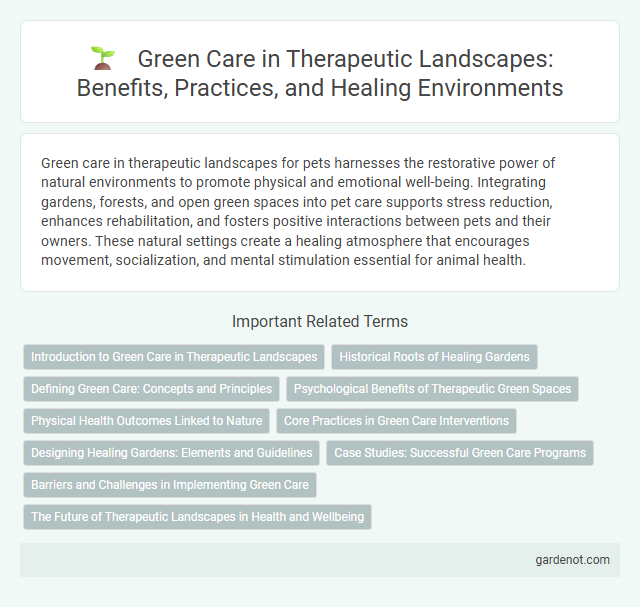Green care in therapeutic landscapes for pets harnesses the restorative power of natural environments to promote physical and emotional well-being. Integrating gardens, forests, and open green spaces into pet care supports stress reduction, enhances rehabilitation, and fosters positive interactions between pets and their owners. These natural settings create a healing atmosphere that encourages movement, socialization, and mental stimulation essential for animal health.
Introduction to Green Care in Therapeutic Landscapes
Green care integrates natural environments and therapeutic practices to enhance mental and physical well-being within therapeutic landscapes. This approach harnesses the restorative qualities of green spaces, such as parks, gardens, and forests, to promote healing, reduce stress, and improve social interaction. Research evidences that exposure to green care settings supports recovery from mental health conditions and fosters holistic health outcomes.
Historical Roots of Healing Gardens
Healing gardens have ancient origins dating back to Mesopotamian and Egyptian civilizations, where green spaces were integral to spiritual and physical well-being. In medieval Europe, monastic gardens combined medicinal plants with contemplative environments to promote healing. These historical roots of green care underscore the enduring relationship between nature and therapeutic practices in creating restorative landscapes.
Defining Green Care: Concepts and Principles
Green care encompasses therapeutic practices that integrate natural environments to promote mental and physical well-being. It involves activities such as horticulture, animal-assisted therapy, and nature-based interventions designed to enhance health outcomes through interaction with greenery. Central principles include sustainability, biophilia, and holistic healing, emphasizing connection with nature as a catalyst for emotional and restorative benefits.
Psychological Benefits of Therapeutic Green Spaces
Therapeutic green spaces in green care settings significantly reduce stress, anxiety, and depression by promoting relaxation and mental restoration. Exposure to natural environments enhances mood, cognitive function, and emotional resilience through biophilic engagement and sensory stimulation. These psychological benefits support recovery and improve overall well-being in both clinical and community contexts.
Physical Health Outcomes Linked to Nature
Green care interventions significantly improve physical health outcomes by promoting increased physical activity and reducing stress-related symptoms. Exposure to natural environments has been linked to lower blood pressure, enhanced immune function, and faster recovery from illness. These therapeutic landscapes encourage holistic well-being by integrating nature-based activities into healthcare and rehabilitation programs.
Core Practices in Green Care Interventions
Core practices in green care interventions emphasize the integration of nature-based activities such as horticulture, animal-assisted therapy, and wilderness therapy to promote mental and physical well-being. These practices leverage natural environments to reduce stress, enhance mood, and improve social interaction among participants. Evidence highlights structured, evidence-based programs tailored to individual needs as essential for maximizing therapeutic outcomes in green care settings.
Designing Healing Gardens: Elements and Guidelines
Healing gardens in green care integrate natural elements such as native plants, water features, and sensory pathways to promote physical and mental well-being. Design guidelines emphasize accessibility, safety, and restorative views, ensuring spaces accommodate diverse users including those with mobility challenges or cognitive impairments. Effective healing gardens foster connection with nature, support stress reduction, and encourage social interaction in therapeutic settings.
Case Studies: Successful Green Care Programs
Case studies of successful green care programs demonstrate significant improvements in mental health, with participants reporting reduced stress and enhanced well-being through nature-based activities like horticultural therapy and animal-assisted interventions. Research from the Netherlands and the UK highlights increased social inclusion and cognitive function among individuals with chronic conditions engaged in green care projects. Evaluation metrics consistently show decreased anxiety levels and improved life satisfaction scores, validating green care as an effective therapeutic landscape strategy.
Barriers and Challenges in Implementing Green Care
Limited funding and lack of awareness among policymakers present significant barriers to implementing green care initiatives effectively. Inadequate training for healthcare professionals and difficulties in integrating green care within conventional medical frameworks hinder widespread adoption. Furthermore, challenges in measuring clinical outcomes and securing stakeholder collaboration impede the scaling of therapeutic landscapes.
The Future of Therapeutic Landscapes in Health and Wellbeing
Green care integrates natural environments into therapeutic practices, enhancing mental health and physical wellbeing through exposure to biodiversity and restorative landscapes. Emerging research highlights how urban green spaces and biophilic design contribute to stress reduction, improved mood, and accelerated recovery from illness. Future developments in therapeutic landscapes will prioritize accessibility, ecosystem services, and technological integration to maximize health outcomes and promote sustainable wellbeing.
Green care Infographic

 gardenot.com
gardenot.com